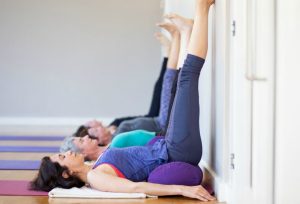Reduce Menopausal Symptoms with Yoga
By John M. de Castro, Ph.D.
“When I feel overwhelmed with hot flashes and out-of-control emotions, I head back to basics. In yoga it’s called ‘”beginner’s mind,” which is the concept of dropping what I think I know and surrendering to my body’s natural wisdom.” – Rachel Zinman
Menopause occurs in the 40s and 50s in most women, on average at 51 years of age. It is a natural physical process that marks the end of the menstrual cycle. The symptoms that occur over the years preceding menopause include irregular periods, vaginal dryness, hot flashes, chills
night sweats, sleep problems, mood changes, weight gain and slowed metabolism, thinning hair and dry skin, and loss of breast fullness. This is a natural process that is healthy and needs to occur. So, treatments are designed for symptomatic relief and include drugs and hormone treatments.
Mindfulness training may be a more natural treatment for the symptoms of menopause. Indeed, the mindful practice of yoga has been shown to improve the cardiac symptoms of menopause. There is accumulating evidence of the effectiveness of yoga practice for the treatment of the symptoms of menopause. So, it makes sense to step back and summarize what has been learned.
In today’s Research News article “Improving vasomotor symptoms; psychological symptoms; and health-related quality of life in peri- or post-menopausal women through yoga: An umbrella systematic review and meta-analysis.” (See summary below or view the full text of the study at: https://www.ncbi.nlm.nih.gov/pmc/articles/PMC6980280/), Shepherd-Banigan and colleagues review, summarize, and perform a meta-analysis of the effectiveness of yoga practice for the treatment of the symptoms of menopause.
They identified 8 randomized controlled trials. They report that the published research studies found that yoga practice significantly reduced the severity of hot flashes and psychological symptoms such as depression. No serious adverse events were reported.
The results correspond to previous findings that yoga practice significantly decreases depression symptoms and menopausal symptoms. Hence the published research suggests that yoga practice is safe and effective for peri-menopausal and menopausal women, reducing menopause physical and psychological symptoms.
So, reduce menopausal symptoms with yoga.
“There is no more creative force in the world than the menopausal woman with zest.” – Margaret Mead
CMCS – Center for Mindfulness and Contemplative Studies
This and other Contemplative Studies posts are also available on Google+ https://plus.google.com/106784388191201299496/posts and on Twitter @MindfulResearch
Study Summary
Shepherd-Banigan, M., Goldstein, K. M., Coeytaux, R. R., McDuffie, J. R., Goode, A. P., Kosinski, A. S., Van Noord, M. G., Befus, D., Adam, S., Masilamani, V., Nagi, A., & Williams, J. W., Jr (2017). Improving vasomotor symptoms; psychological symptoms; and health-related quality of life in peri- or post-menopausal women through yoga: An umbrella systematic review and meta-analysis. Complementary therapies in medicine, 34, 156–164. https://doi.org/10.1016/j.ctim.2017.08.011
Objectives:
Vasomotor symptoms (VMS), commonly reported during menopausal transition, negatively affect psychological health and health-related quality of life (HRQoL). While hormone therapy is an effective treatment, its use is limited by concerns about possible harms. Thus, many women with VMS seek nonhormonal, nonpharmacologic treatment options. However, evidence to guide clinical recommendations is inconclusive. This study reviewed the effectiveness of yoga, tai chi and qigong on vasomotor, psychological symptoms, and HRQoL in peri- or post-menopausal women.
Design:
MEDLINE, Cochrane Database of Systematic Reviews, EMBASE, CINAHL and the Allied and Complementary Medicine Database were searched. Researchers identified systematic reviews (SR) or RCTs that evaluated yoga, tai chi, or qigong for vasomotor, psychological symptoms, and health-related quality of life (HRQoL) in peri- or post-menopausal women. Data were abstracted on study design, participants, interventions and outcomes. Risk of bias (ROB) was assessed and updated meta-analyses were performed.
Results:
We identified one high-quality SR (5 RCTs, 582 participants) and 3 new RCTs (345 participants) published after the SR evaluating yoga for vasomotor, psychological symptoms, and HRQoL; no studies evaluated tai chi or qigong. Updated meta-analyses indicate that, compared to controls, yoga reduced VMS (5 trials, standardized mean difference (SMD) −0.27, 95% CI −0.49 to −0.05) and psychological symptoms (6 trials, SDM −0.32; 95% CI −0.47 to −0.17). Effects on quality of life were reported infrequently. Key limitations are that adverse effects were rarely reported and outcome measures lacked standardization.
Conclusions:
Results from this meta-analysis suggest that yoga may be a useful therapy to manage bothersome vasomotor and psychological symptoms.
https://www.ncbi.nlm.nih.gov/pmc/articles/PMC6980280/
